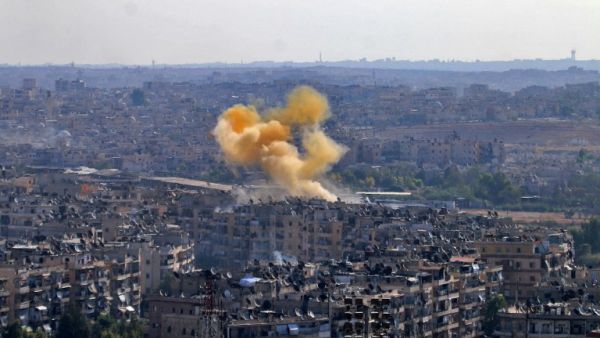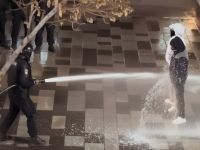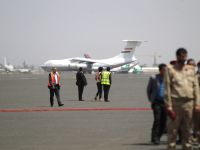Six Western powers demanded Wednesday an "immediate ceasefire" to bring aid into rebel-held Aleppo, warning "a humanitarian disaster" is unfolding as the enclave shrinks in size amid an aggressive advance by Syrian government forces.
The government and Russia have indicated they would only accept a surrender by the embattled rebel forces, calling on them to agree to leave the territory. The opposition has lost 80 per cent of the eastern section of the city which it controlled.
"We condemn the actions of the Syrian regime and its foreign backers, especially Russia, for their obstruction of humanitarian aid," the statement from the US, Britian, Germany, France, Italy and Canada said.
The statement said the Western nations "strongly condemn the Syrian regime's attacks that have devastated civilians and medical facilities and use of barrel bombs and chemical weapons."
Kremlin spokesman Dmitry Peskov said all rebels who choose to remain in the collapsing enclave will be deemed as linked to al-Qaeda's wing in Syria, a strong force in the country.
"The exit was offered to them and this issue was discussed earlier," Peskov said about the rebels, according to the Russian state news agency TASS. "Unfortunately, only a few have exited," he added.
"We will not accept any truce," Fares Shehabi, a pro-government member of parliament for Aleppo, told dpa by telephone. "If they do not leave, we will continue our attack," he warned the armed groups.
Meanwhile, Syrian president Bashar al-Assad said in an interview to be published on Thursday in the pro-regime Al Watan newspaper, that winning the battle of Aleppo does not mean ending the country's civil war.
"But it will be a big step towards ending terrorism," Al-Assad said.
"The decision to liberate all of Syria has been taken from the beginning, including Aleppo. We did not think one day that we will leave any (Syrian) territory without liberation," the Syrian president said.
He added that the battle of Aleppo will definitely change the course of the Syrian war.
Despite little leverage on the ground, the rebels are asking for a pause in fighting to let civilians move to areas in northern Aleppo province held by the opposition and Turkish troops.
This week, Russia and China vetoed a UN Security Council draft resolution on a truce for the enclave, where estimates say thousands of people remain.
US Secretary of State John Kerry said late Tuesday talks were ongoing but warned the militants "have to make their choices", without a better deal on the table.
The Syrian Observatory for Human Rights said the government now controls the Old City of Aleppo and the grand Umayyad Mosque, iconic areas in Aleppo, once Syria's key economic hub, which are recognized as UN World Heritage Sites.
Residents still in eastern Aleppo have pushed deeper south, amid testimony that conditions are becoming increasingly difficult due to illness, food shortages and a lack of medical facilities.
People are also reporting deteriorating psychological conditions. One resident said that amid the chaos he had lost track of his family.
Hospitals have been repeatedly bombed by Syrian and Russian forces and a doctor said that a makeshift underground clinic remains, though it is only able to carry out very basic services.
Pictures posted by some activists on a message group showed bodies lying on the ground waiting to be buried.
"Simply, people are unable to bury their loved [ones] anymore because of the heavy shelling and the danger engulfing the area," said Wissam Zarqa.
Some civilians have expressed fears about what may happen to them if the government takes control.
There are reports of hundreds of young men being taken into custody by the government forces. Officials claim this is a security measure, but there are long-standing accusations of abuses in jails.
In previous deals with the government, the rebels have agreed to evacuate besieged areas and move to Idlib province, near the Turkish border.
However, the rebels are now saying that they no longer see Idlib as a safe option. Instead, they want evacuations to head to the Turkish-occupied zone in north Aleppo province.
Ankara invaded northern Syria in August, saying it was pushing back terrorists from its border and now controls a salient.
Meanwhile, the Russian Defence Ministry said one of its military advisers was killed in Aleppo.
Near the capital Damascus, Israel carried out air raids on a Syrian army air base, according to media reports from outlets close to the Syrian government. Israeli Defence Minister Avigdor Lieberman said Israel acts in Syria to prevent weapon transfers to Lebanon.
Adding to the woes for Syrians, medical aid group Doctors Without Borders (MSF) said it is closing a medical facility in a Syrian refugee camp in Jordan because the wounded can no longer reach the treatment centre.
"Since Jordan decided to close its borders with Syria in June this year, the number of war wounded coming over has plummeted," said Charlotte Morris, an MSF spokeswoman.
Turkey has also shut its borders to refugees, leaving civilians wishing to escape the conflict with no exits.








